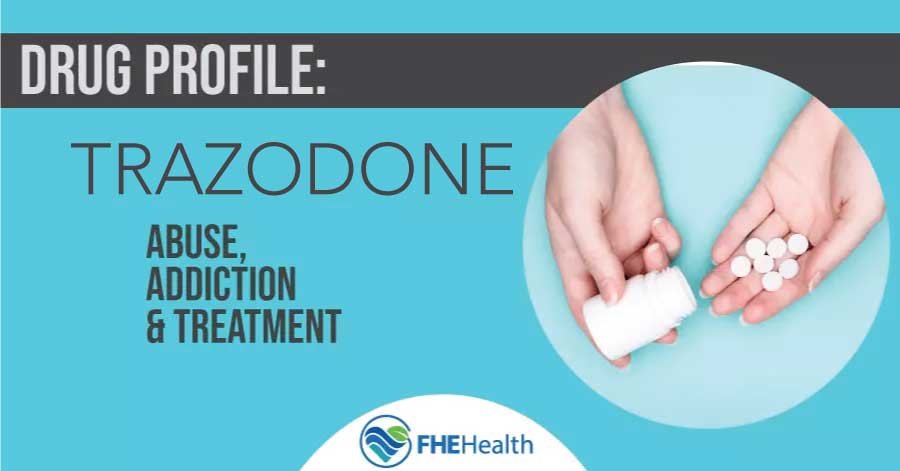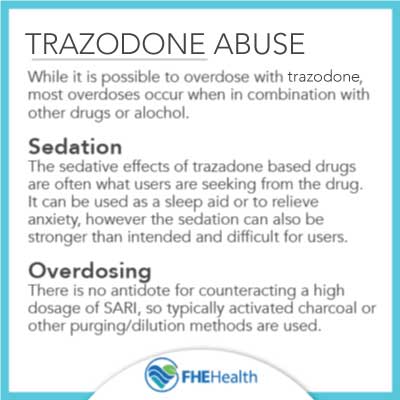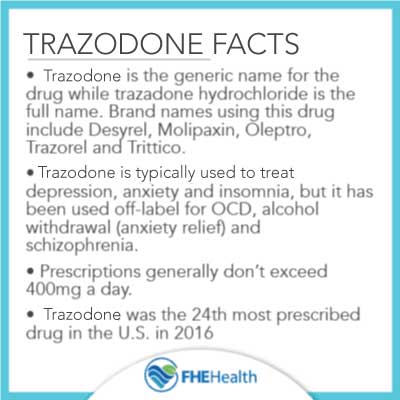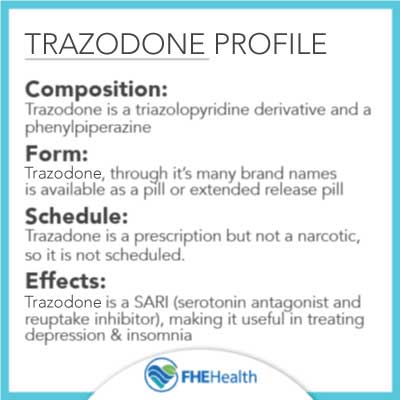
The National Institute of Mental Health estimates that 17.3 million adults in the United States had at least one major depressive episode in their lives. According to its report, “an estimated 65 percent received combined care by a health professional and medication treatment.” Doctors now have various medications to help treat depression, giving people more options to manage their symptoms. Sometimes, though, finding the right one takes time…and a bit of trial and error.
Trazodone is one of those medications commonly prescribed for major depressive disorders. Also sold under the brand names “Desyrel” and “Oleptro,” it belongs to a class of drugs called serotonin antagonists and reuptake inhibitors. Unlike narcotics, it works by adjusting serotonin levels in the brain. However, trazodone still carries side effects and a real, albeit sometimes overlooked, risk of misuse.
Treatment can begin quickly and discreetly, get started now First hitting pharmacy shelves in 1987, trazodone works by modulating serotonin levels, classifying it as a serotonin antagonist and reuptake inhibitor (SARI). If you’re struggling with depression, sleepless nights, or certain anxiety conditions, your doctor might, after careful consideration, suggest trazodone as a treatment option. In certain cases, it has also been used to treat schizophrenia. Trazodone, similar to other medications in its class, targets the brain’s serotonin system, aiming to restore chemical levels back into balance. But, like any medication, it’s not a perfect fix for everyone. Trazodone is not a narcotic or controlled substance, but it does have the potential to become a substance of abuse owing to its sedative properties. Doctors prescribe this medication to adults as well as teens and children. Because one severe side effect of trazodone happens to be suicidal thoughts, doctors must carefully monitor patients who are taking it. Especially those with a history of depression. Trazodone is prescribed in tablet form and is also available in an extended- release tablet. Typically, doctors begin with a 150-milligram dose of trazodone, carefully adjusting the amount based on the patient’s response. Seldom does a dose exceed 400 milligrams per day (MayoClinic). People who abuse this drug and buy it on the street may know it by its slang name: “sleepeasy.” It is also referred to as “pliva 433,” “trazzy,” and “goopenthal.” Trazodone inhibits the brain’s 5HT2a receptor, a serotonin receptor, like other SARIs. Blocking the serotonin protein increases the amount of active serotonin in the brain and central nervous system. When trazodone effectively regulates serotonin, individuals often notice a positive shift in their mood and a return of their appetite. Relief from insomnia is another common effect of this medication. Drowsiness is a noticeable trazodone side effect. Some people also experience dizziness, headache, dry mouth, and blurred vision. Those taking trazodone for depression may need to wait a few weeks before seeing results, but those using it for insomnia or anxiety often feel the effects much sooner. More people have started snorting trazodone, especially those who already use drugs like cocaine and LSD. Some have reported that trazodone enhances or prolongs the effects of hard drugs like cocaine, ecstasy, and amphetamine. Combining trazodone with drugs and alcohol is dangerous and could lead to overdose. And, sometimes, a fatal one. Ready to start? More questions about treatment? A common experience for those taking trazodone is feeling sleepy, especially in the initial stages of treatment. Due to the potential for significant drowsiness, it’s crucial to be cautious while taking trazodone, as some individuals have experienced falls or other injuries. Higher doses can make this worse, increasing the chances of impaired thinking and loss of balance. Overdosing on trazodone is also a real possibility. Buying trazodone off the street comes with added dangers. Many do not know its source or what it may be mixed with. Mixing trazodone with alcohol or other drugs can also dangerously elevate the side effects of trazodone. And sometimes, those street pills are not what they claim to be. Individuals who abuse trazodone and are at risk for addiction typically experience physical and mental symptoms that may include: Some side effects of trazodone abuse are serious and potentially life-threatening, like seizures, irregular heartbeat, shallow breathing, and coma. People who are addicted to this drug may also find it impossible to stop taking it. Other common signs of addiction include: A person’s needs determine the best way to stop taking trazodone. Outpatient detox works for many, but some may need medical detox. Doctors supervise the process and gradually lower the dose when inpatient care is the safer choice. Medications are sometimes prescribed to ease withdrawal symptoms and make the process more manageable. It’s important for addiction sufferers to note that detox is not a cure for addiction. Detox only addresses the physical dependency on the drug. Mental and behavioral dependencies can be profoundly powerful, so treatments that address the psychological components of substance addiction are vital. FHE Health offers a continuum of care. For instance, initial treatment usually involves intensive residential therapy and support. As patients progress through detox and therapies, they require less support. Nevertheless, returning to their lives and continuing their recovery process can be challenging. Many people benefit from aftercare programs that include group counseling sessions or time in a sober living community. Addiction is a chronic disease that is typically progressive—sometimes disastrously so—without proper treatment. FHE Health is highly respected for its comprehensive treatment programs designed to help individuals manage their addictions. Contact FHE Health to learn how its programs can help you. Its addiction specialists can provide you with an evaluation and help you determine the best treatment protocol for your needs. We offer 100% confidential and individualized treatment With an insistence on only the highest standards in policy compliance and documentation, and a strong commitment to highly ethical business practices... read moreNeed Help?
What Is Trazodone?
Identifying Trazodone
How Does Trazodone Work?
What are the Abuse and Addiction Risks of Trazodone?
 Trazodone is not regarded by the medical community as an addictive drug, which is why many physicians prefer to prescribe it for insomnia over drugs like Ambien, which are associated with a higher risk for addiction. Trazodone leaves the system much faster than Ambien. Abuse and addiction, however, remain serious concerns. Many who misuse trazodone do so because of its sedative effects. At high doses, hallucinations can occur as a trazodone side effect.
Trazodone is not regarded by the medical community as an addictive drug, which is why many physicians prefer to prescribe it for insomnia over drugs like Ambien, which are associated with a higher risk for addiction. Trazodone leaves the system much faster than Ambien. Abuse and addiction, however, remain serious concerns. Many who misuse trazodone do so because of its sedative effects. At high doses, hallucinations can occur as a trazodone side effect.Begin your recovery today
What are the Dangers and Side Effects of Trazodone Abuse?
What is the Treatment for Trazodone Abuse and Addiction?
 Individuals who abuse this drug or feel that they cannot stop taking it should seek help from an addiction treatment center or mental health center like FHE Health, which specializes in addiction medicine and treatment. Psychological dependence and compulsive use can develop with long-term use, even though trazodone isn’t very addictive in a physical sense. When combined with other substances, treatment can become more complicated. And, sometimes, require a longer treatment period.
Individuals who abuse this drug or feel that they cannot stop taking it should seek help from an addiction treatment center or mental health center like FHE Health, which specializes in addiction medicine and treatment. Psychological dependence and compulsive use can develop with long-term use, even though trazodone isn’t very addictive in a physical sense. When combined with other substances, treatment can become more complicated. And, sometimes, require a longer treatment period.Ongoing Support
Contact FHE Health for Personalized Addiction Recovery Support
More Questions about Treatment?
About Brett Friedman







